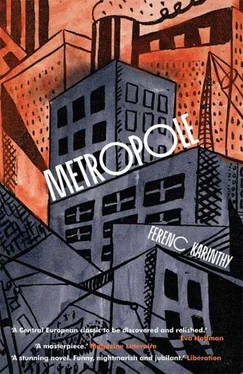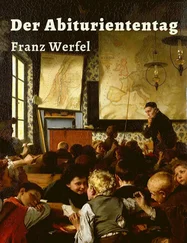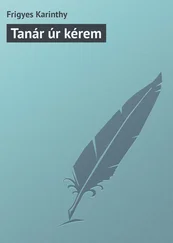He hadn’t expected the blonde woman operator to be on duty since she had been there in the morning: it surprised him to see her as the doors opened. She looked exhausted and broken, her face too red, her eyelids drooping as she played the keys with her long, carefully manicured fingers. Could she have been working all this time? Or was this a second shift after a break at home? Where did she live, in fact, in the hotel or with a family? Does she have a family, a husband?… The air in the lift was more oppressive than usual and only later did he notice that the ventilator was out of commission. Entering he had positioned himself so as to be quite close to the girl. Under the light, tiny drops of perspiration twinkled on the faint down of her brow. Budai’s inhibitions had been loosened by drink and he used his newspaper to fan the girl’s neck and forehead. She slowly turned, more in amazement than protest, and said something too, giving a short laugh. It was the first time Budai had seen her smile. Suddenly he felt weak and tender: he wanted to stay with her, so that she could relax at his side… Yes, whatever way he looked at it, thinking about her and about himself, that was all he wanted, to lie down with her in one bed and wait patiently as she nodded off, hearing her breathing, seeking out the pulse on the tight skin of her wrist: indeed, that would be the most satisfying thing he could possibly do. She had to remind him to get off when they reached the ninth floor. So she remembered. She had noticed him.
His room had been tidied again and the bed made but the telephone directory he had pinched yesterday had gone. They must have discovered it as they were making the room up and taken it away along with the notes he had made at the back of the book. He had the paper and could start again but really did not feel like it now. His muscles ached with tiredness, after all, he had been on his feet all day, coming and going, tramping here and there — thinking that, he realised he had wasted another day, or, rather, that he didn’t know whether he had or had not made any progress at all and was seized by a mixture of terror and ironic self-recrimination. He removed his clothes in confusion: one moment he was shuddering and feverish, disgusted by the thought of failure, the next he was drowsy and faintly drunk, thinking ‘ who the hell gives a damn’ . He showered and lay down without turning off the bedside lamp. The fault must be in his character: he found any kind of aggression or self-promotion distasteful. The truth of this dawned on him slowly as he dozed. If he could not overcome his shyness and sensitivity, his instinctive reluctance to put people out, he would never get out of here, nor would anybody find out where he was or lift a finger to help him. He must fight this battle alone, there were no two ways about it: he must transform himself from top to toe, it was the only way to rediscover himself and assert his being.
Awake now, he felt so indignant that he smashed his fist on the bedside table and the glass on it cracked and cut his hand. He was bleeding quite badly. He bandaged the cut with his handkerchief then twisted a towel around it for good measure but the blood still seeped through: he hated, he utterly loathed this town that was nothing but cuts and blows, that was forcing him to act against his nature, that gripped him and would not let him go, that hung on to him and pulled him back.
He was having a recurring dream. He was in Helsinki, in that long familiar harbour town, walking its cool damp streets and wherever he set out from — whether it was from the cathedral, the opera, the fish-market or the Olympic Stadium — he always arrived at the sea. He liked this dream. He liked seeing the horizon slowly brightening to blue behind the rows of brown and white houses: he could almost conjure it up when awake, draw it forth from his distant memories in the period of shallow consciousness hovering between light and dark while waking or falling asleep. The conference would be pretty near over by now as it was only programmed to last, at most, some three or four days, depending on the number of speakers. He had hardly seen any water since arriving here, no river, no lake, none that he could remember, except perhaps at the fair where he took a boat, or in the park the pond where children played with model yachts.
The cut on his hand was slow to heal. It hurt and pulsed and he had to bandage it several times using clean handkerchiefs. He decided to keep off drink as he seemed to have become rather too accustomed to it here. He wanted his mind to be clear and sharp, not muddled, and he kept his resolution over the next few evenings. He developed an interim regime for himself. He ate twice, in the morning and the afternoon, usually in the same self-service buffet near the skyscraper, and spent the rest of the time exploring the streets and the metro system. Two or three times when he left the hotel he did not hand in his key so as to save queuing when he returned. But then he thought better of it: it would only lead to confusion if people were looking for him and were unable to determine when he was in his room or outside somewhere. Besides all this, his passport had failed to reappear and he never saw the grey-haired clerk with whom he had left it that first evening.
There were ever new schemes and plans to consider that served to conceal the nature of his situation for there were days when he simply could not face it. One of his schemes was to make several copies of a notice in six languages that he posted at various places in the hotel — along the corridors, in the lift and in the entrance lobby — asking whoever might read and understand it to seek him out in Room 921, or, if he wasn’t there, to leave a message for him at the desk in return for a handsome reward. Having put those up he knocked at a few neighbouring doors but mostly he received no answer: it might not have been the best time, the guests might not have been in their rooms, or it may be that he knocked too quietly. When he did find someone in it seemed he had disturbed them. At one door an aggressive female voice demanded to know something, at another when, having received an incomprehensible answer, he opened the door he stumbled in on two young olive-brown men in pyjamas who sprang apart, one of whom — a short, bespectacled, skinny chap — ran past him out into the corridor and disappeared round a corner. The door next to it was already open and he peered through the crack before warily stepping inside but an overwhelming smell, worse than a pigsty, stopped him in his tracks. There was no one there, only cages containing fat, overgrown angora rabbits. The room was full of rabbits: on the floor, on the chairs, on the luggage rack, on top of the cupboards, even under the bed, in the bathroom, in the shower cubicle, in the toilet bowl, all nibbling, all snuffling in their cages, all stupidly mizzling and stinking with urine.
Then he came up with a new idea. At dawn he would go down to the hotel entrance and wait there for the bus that had brought him from the airport. But he was no longer able to remember either what time the bus had arrived or what colour it was for he hadn’t seen it from the outside, and though he had been the last to get off it was by no means certain that this was the bus’s last stop, it might have been pure chance, the bus stopping only for a moment. That was why he started hanging about outside in the constantly seething crowd among all those elbows and knees. He stood firm, careful not to be swept away, but was unable to identify the right bus in the traffic. It might have been that the flight on which he had arrived was not a daily service.
The excursions were not wholly useless though because, seeing a passing policeman with his rubber truncheon, he suddenly had an idea, his best and most important yet, something so brilliantly simple and sure to succeed that he actually gave a whoop when it occurred to him. If he were to be taken away by the police, for whatever reason, he was bound to be questioned and listened to, and if they did not understand him they would be obliged to supply an interpreter to whom he could finally tell his story… He hurried back to his room to rest, to think the scheme through and settle on a course of action that would be certain to end in his arrest. He could start a fight, he could assault a passer-by, put a brick through a shop window or the pane of a telephone booth. He could puncture the tyres of cars stuck at traffic lights, possibly even smash their headlights. He could light a fire in a square or a park using newspapers and scraps of waste paper. He had, however, always felt nervous about committing any common breaches of the law and was concerned in case angry local people hurt him before the police arrived. He had seen a fountain in the shape of a stone elephant in the old town: what would happen if he decided to bathe in it? It might be enough to undress in the street but his natural reticence shrank from the idea. And what if he pretended to be ill, to simulate an epileptic fit, to throw himself on the ground with some soap in his mouth to make it froth, the way some conmen did?
Читать дальше












